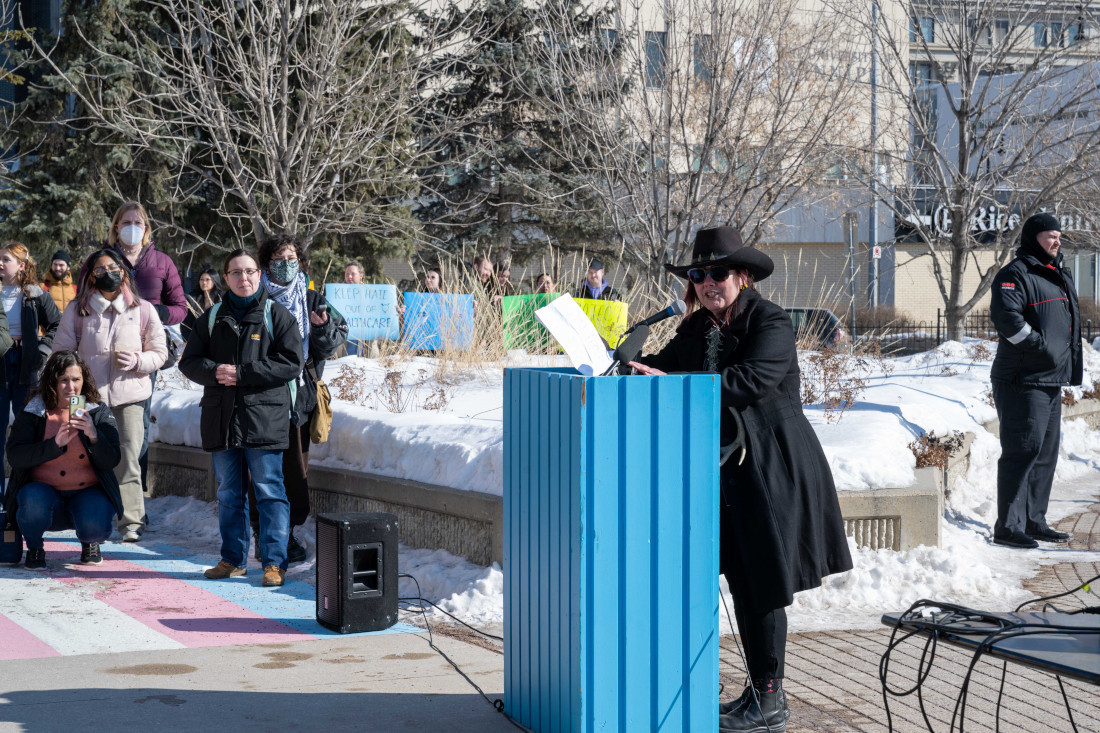In search of trans safety on campus
Building Trans Solidarity series will explore inclusion, resiliency, allyship
The University of Winnipeg (U of W) 2SLGBTQ+ Solidarity Collective is hosting a week of events to help reshape conversations surrounding trans issues on campus.
The Building Trans Solidarity five-event series runs from Sept. 23 to Oct. 5 and will “unpack contemporary issues facing transgender, Two-Spirit and gender-nonconforming communities, celebrate their resiliency and work toward an inclusive, discrimination-free future,” according to a U of W media release.
A roundtable discussion, a keynote talk and a film screening will all take place on the U of W campus. Another Place//, a poetry and sound art show, is scheduled for Sunday, Oct. 1 at aceartinc. Transphobia Right and Left, a virtual roundtable, will close out the series on Thursday, Oct. 5.
“We want to weave these kinds of conversations into the fabric of campus life,” Dr. Noah Schulz says. Schulz is a collective member and an instructor in the U of W’s political-science department. “We want trans realities and issues, in theory, to be respected as knowledge that’s important and can be advanced in the university,” he says.
Schulz will moderate the Saturday, Sept. 23 roundtable discussion, Supporting 2SLGBTQ+ Students in Our Schools and Libraries. It starts at 2 p.m. in Eckhardt-Grammaté Hall and frames K-12 public schools as the “frontlines of protecting trans and gender-diverse students.”
Schulz says speakers will also draw connections between anti-trans sentiment and other forms of bigotry.
“We know that queer and other marginalized people get scapegoated in these times,” he says. “We know that these movements are interlocking... it connects with white supremacy and antisemitism and attacks on reproductive rights.”
Framing Agnes, an award-winning reenacted documentary examining trans histories and legacies, will show in Eckhardt-Grammaté Hall at 6:30 p.m. on Sept. 23. Chase Joynt, the film’s director, will participate in a Zoom question-and-answer session after the screening.
The U of W Students’ Association (UWSA) 2SLGBTQ* director Brie Villeneuve is delivering the series’ keynote talk: Sex, Gender, and Identity: How to Be a Better Trans Ally. Their talk takes place Wednesday, Sept. 27 at 12:30 p.m. in The Hive, located next to the main campus’ Ellice Street exit.
Villeneuve says their talk will provide U of W community members with an opportunity to learn how to support trans students and colleagues from “a trans person who spends a lot of time educating themselves on these topics and listening to other trans people.”
They hope university decision-makers attend the talk and understand that conversations about protecting the U of W’s trans communities need to be proactive and ongoing, instead of only happening in response to specific incidents.
The 2SLGBTQ+ Solidarity Collective was founded in March to organize a rally to coincide with U of W political-science professor Dr. Joanne Boucher’s controversial talk called The Commodification of the Human Body: The Case of Transgender Identities.
U of W community members raised concerns about the “transphobic undertones” of posters on campus advertising the talk. An online petition calling for the event’s cancellation received nearly 1,800 signatures.
Boucher avoided making policy recommendations during the talk and declined to answer audience questions about her stance on trans healthcare policies in Canada. She also denied knowing about the precise wording used on the posters advertising her talk.
Several people interviewed for this article mentioned Boucher’s talk as a turning point for trans students’ sense of safety on campus.
UWSA Rainbow Lounge coordinator James Webster says the administration’s response to Boucher’s talk demonstrated an attitude that prioritizes cisgender comfort over trans safety.
“The administration is mostly in that on-the-fence category, where they don’t have a strong opinion one way or the other,” they say. “They’re not hindering (safety) actively, but they’re not helping, either.”
Webster says administrators should consider how trans students can more directly provide them with feedback about their experiences on campus.
“It should be (that) any student can go up and say ‘This is wrong. You wronged me.’ and have the administrators and the school and the UWSA listen to them,” he says. “It just feels like, especially in feedback about trans-inclusive policies, they only want to listen to people in positions of power.”
Safety concerns are front of mind for Void, an agender first-year student who spends most of their time between classes in the Rainbow Lounge.
“I don’t feel safe being around cishet (cisgender heterosexual) people,” Void says. “I don’t feel like I can be myself around them. Luckily, I have my safe space at the Rainbow Lounge, but I wish I could spend more time openly.”
Void alternately uses they/them and it/its pronouns. “I find a lot of comfort in the sort of lack of humanity,” Void says about going by it/its pronouns. “I don’t vibe with this concept of being limited to my body as a binary, so I completely separate myself from this human binary by using inhuman pronouns.”
While they want to help spread awareness of why some nonbinary folks find comfort in it/its pronouns, Void says anxiety over its personal safety holds it back from being as open as it wants to be. They usually wear pronoun, queer and political pins but haven’t worn them lately.
Void says cishet community members are the most important audience for the event series to reach.
“(The events are) meant for people who want to be better, not for people who are already in the community,” they say. “Whenever this stuff is getting spread, really try and make sure (that) it’s hitting the audience that actually needs it, not the audience that already fucking knows.”
Dates, times and locations for each event are available at bit.ly/3PJ6bZt.
Published in Volume 78, Number 03 of The Uniter (September 21, 2023)







